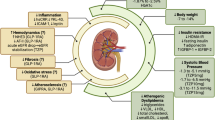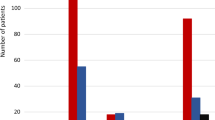Abstract
Purpose
Glucagon-like peptide-1 receptor agonists (GLP-1RAs) have been suggested to be associated with an increased risk of pancreatitis and pancreatic cancer. The aim of this meta-analysis was to collect data from large-scale cardiovascular outcome trials (CVOTs) to assess the effect of GLP-1RAs on the incidence of acute pancreatitis and pancreatic cancer.
Methods
Database of Medline, Embase, and the Cochrane Central Register of Controlled Trials were extensively searched up to October 10, 2019. Randomized controlled trials were eligible if they compared GLP-RA with placebo as add-on therapy to standard care in T2DM patients, and reported outcomes required for cardiovascular safety studies and events of acute pancreatitis and/or pancreatic cancer. Peto odds ratio (OR) with 95% confidence interval (CI) was calculated for acute pancreatitis and pancreatic cancer.
Results
Seven CVOTs enrolling 56,004 patients with T2DM were identified, with a median follow-up time ranging from 1.3 to 5.4 years. A total of 180 cases of acute pancreatitis and 108 cases of pancreatic cancer were reported. The risk of either acute pancreatitis or pancreatic cancer with GLP-1-RA treatment was not significantly different from that observed in placebo arm (Peto OR [95% CI] 1.05 [0.78–1.40], P = 0.76, and 1.12 [0.77–1.63], P = 0.56, respectively), and the results remained robust to sensitivity analyses.
Conclusion
Pooled analysis of CVOTs did not suggest any increased risk of either acute pancreatitis or pancreatic cancer with GLP-1RA treatment in T2DM patients.



Similar content being viewed by others
References
International Diabetes Federation. IDF diabetes atlas, 9th edn. (2019). http://www.diabetesatlas.org/across-the-globe.html. Accessed 25 Nov 2019
R. Pannala, J.B. Leirness, W.R. Bamlet, A. Basu, G.M. Petersen, S.T. Chari, Prevalence and clinical profile of pancreatic cancer-associated diabetes mellitus. Gastroenterology 134(4), 981–987 (2008). https://doi.org/10.1053/j.gastro.2008.01.039
F. Bragg, M.V. Holmes, A. Iona, Y. Guo, H. Du, Y. Chen, Z. Bian, L. Yang, W. Herrington, D. Bennett, I. Turnbull, Y. Liu, S. Feng, J. Chen, R. Clarke, R. Collins, R. Peto, L. Li, G. Z. Chen, China Kadoorie Biobank collaborative: association between diabetes and cause-specific mortality in rural and urban areas of China. JAMA 317(3), 280–289 (2017). https://doi.org/10.1001/jama.2016.19720
A. Gonzalez-Perez, R.G. Schlienger, L.A. Rodriguez, Acute pancreatitis in association with type 2 diabetes and antidiabetic drugs: a population-based cohort study. Diabetes Care 33(12), 2580–2585 (2010). https://doi.org/10.2337/dc10-0842
C.J. Girman, T.D. Kou, B. Cai, C.M. Alexander, E.A. O’Neill, D.E. Williams-Herman, L. Katz:, Patients with type 2 diabetes mellitus have higher risk for acute pancreatitis compared with those without diabetes. Diabetes Obes. Metab. 12(9), 766–771 (2010). https://doi.org/10.1111/j.1463-1326.2010.01231.x
R.A. Noel, D.K. Braun, R.E. Patterson, G.L. Bloomgren, Increased risk of acute pancreatitis and biliary disease observed in patients with type 2 diabetes: a retrospective cohort study. Diabetes Care 32(5), 834–838 (2009). https://doi.org/10.2337/dc08-1755
S.P. Marso, S.C. Bain, A. Consoli, F.G. Eliaschewitz, E. Jodar, L.A. Leiter, I. Lingvay, J. Rosenstock, J. Seufert, M.L. Warren, V. Woo, O. Hansen, A.G. Holst, J. Pettersson, T. Vilsboll; S.-. Investigators, Semaglutide and cardiovascular outcomes in patients with type 2 diabetes. N. Engl. J. Med. 375(19), 1834–1844 (2016). https://doi.org/10.1056/NEJMoa1607141
S.P. Marso, G.H. Daniels, K. Brown-Frandsen, P. Kristensen, J.F. Mann, M.A. Nauck, S.E. Nissen, S. Pocock, N.R. Poulter, L.S. Ravn, W.M. Steinberg, M. Stockner, B. Zinman, R.M. Bergenstal, J.B. Buse; L.S. Committee, L.T. Investigators, Liraglutide and cardiovascular outcomes in type 2 diabetes. N. Engl. J. Med. 375(4), 311–322 (2016). https://doi.org/10.1056/NEJMoa1603827
A.F. Hernandez, J.B. Green, S. Janmohamed, R.B. D’Agostino, Sr,C.B. Granger, N.P. Jones, L.A. Leiter, A.E. Rosenberg, K.N. Sigmon, M.C. Somerville, K.M. Thorpe, J.J.V. McMurray, S.Del Prato; c. Harmony Outcomes, investigators, Albiglutide and cardiovascular outcomes in patients with type 2 diabetes and cardiovascular disease (Harmony Outcomes): a double-blind, randomised placebo-controlled trial. Lancet 392(10157), 1519–1529 (2018). https://doi.org/10.1016/S0140-6736(18)32261-X
M.A. Pfeffer, B. Claggett, R. Diaz, K. Dickstein, H.C. Gerstein, L.V. Kober, F.C. Lawson, L. **, X. Wei, E.F. Lewis, A.P. Maggioni, J.J. McMurray, J.L. Probstfield, M.C. Riddle, S.D. Solomon, J.C. Tardif; E. Investigators, Lixisenatide in patients with type 2 diabetes and acute coronary syndrome. N. Engl. J. Med. 373(23), 2247–2257 (2015). https://doi.org/10.1056/NEJMoa1509225
R.R. Holman, M.A. Bethel, R.J. Mentz, V.P. Thompson, Y. Lokhnygina, J.B. Buse, J.C. Chan, J. Choi, S.M. Gustavson, N. Iqbal, A.P. Maggioni, S.P. Marso, P. Ohman, N.J. Pagidipati, N. Poulter, A. Ramachandran, B. Zinman, A.F. Hernandez; E.S. Group, Effects of once-weekly exenatide on cardiovascular outcomes in type 2 diabetes. N. Engl. J. Med. 377(13), 1228–1239 (2017). https://doi.org/10.1056/NEJMoa1612917
M. Husain, A.L. Birkenfeld, M. Donsmark, K. Dungan, F.G. Eliaschewitz, D.R. Franco, O.K. Jeppesen, I. Lingvay, O. Mosenzon, S.D. Pedersen, C.J. Tack, M. Thomsen, T. Vilsboll, M.L. Warren, S.C. Bain; P. Investigators, Oral semaglutide and cardiovascular outcomes in patients with type 2 diabetes. N. Engl. J. Med. 381(9), 841–851 (2019). https://doi.org/10.1056/NEJMoa1901118
H.C. Gerstein, H.M. Colhoun, G.R. Dagenais, R. Diaz, M. Lakshmanan, P. Pais, J. Probstfield, J.S. Riesmeyer, M.C. Riddle, L. Ryden, D. Xavier, C.M. Atisso, L. Dyal, S. Hall, P. Rao-Melacini, G. Wong, A. Avezum, J. Basile, N. Chung, I. Conget, W.C. Cushman, E. Franek, N. Hancu, M. Hanefeld, S. Holt, P. Jansky, M. Keltai, F. Lanas, L.A. Leiter, P. Lopez-Jaramillo, E.G.Cardona Munoz, V. Pirags, N. Pogosova, P.J. Raubenheimer, J.E. Shaw, W.H. Sheu, T. Temelkova-Kurktschiev; R. Investigators, Dulaglutide and cardiovascular outcomes in type 2 diabetes (REWIND): a double-blind, randomised placebo-controlled trial. Lancet 394(10193), 121–130 (2019). https://doi.org/10.1016/S0140-6736(19)31149-3
M. Elashoff, A.V. Matveyenko, B. Gier, R. Elashoff, P.C. Butler, Pancreatitis, pancreatic, and thyroid cancer with glucagon-like peptide-1-based therapies. Gastroenterology 141(1), 150–156 (2011). https://doi.org/10.1053/j.gastro.2011.02.018
A.E. Butler, M. Campbell-Thompson, T. Gurlo, D.W. Dawson, M. Atkinson, P.C. Butler, Marked expansion of exocrine and endocrine pancreas with incretin therapy in humans with increased exocrine pancreas dysplasia and the potential for glucagon-producing neuroendocrine tumors. Diabetes 62(7), 2595–2604 (2013). https://doi.org/10.2337/db12-1686
S. Singh, H.Y. Chang, T.M. Richards, J.P. Weiner, J.M. Clark, J.B. Segal, Glucagonlike peptide 1-based therapies and risk of hospitalization for acute pancreatitis in type 2 diabetes mellitus: a population-based matched case-control study. JAMA Intern. Med. 173(7), 534–539 (2013). https://doi.org/10.1001/jamainternmed.2013.2720
B. Gier, A.V. Matveyenko, D. Kirakossian, D. Dawson, S.M. Dry, P.C. Butler, Chronic GLP-1 receptor activation by exendin-4 induces expansion of pancreatic duct glands in rats and accelerates formation of dysplastic lesions and chronic pancreatitis in the Kras(G12D) mouse model. Diabetes 61(5), 1250–1262 (2012). https://doi.org/10.2337/db11-1109
L.M. Knapen, J. van Dalem, Y.C. Keulemans, N.P. van Erp, M.T. Bazelier, M.L. De Bruin, H.G. Leufkens, S. Croes, C. Neef, F. de Vries, J.H. Driessen, Use of incretin agents and risk of pancreatic cancer: a population-based cohort study. Diabetes Obes. Metab. 18(3), 258–265 (2016). https://doi.org/10.1111/dom.12605
J.A. Romley, D.P. Goldman, M. Solomon, D. McFadden, A.L. Peters, Exenatide therapy and the risk of pancreatitis and pancreatic cancer in a privately insured population. Diabetes Technol. Ther. 14(10), 904–911 (2012). https://doi.org/10.1089/dia.2012.0075
L. Azoulay, K.B. Filion, R.W. Platt, M. Dahl, C.R. Dormuth, K.K. Clemens, M. Durand, D.N. Juurlink, L.E. Targownik, T.C. Turin, J.M. Paterson, P. Ernst; I. Canadian Network for Observational Drug Effect Studies, Incretin based drugs and the risk of pancreatic cancer: international multicentre cohort study. BMJ 352, i581 (2016). https://doi.org/10.1136/bmj.i581
E. Raschi, C. Piccinni, E. Poluzzi, G. Marchesini, F. De Ponti, The association of pancreatitis with antidiabetic drug use: gaining insight through the FDA pharmacovigilance database. Acta Diabetol. 50(4), 569–577 (2013). https://doi.org/10.1007/s00592-011-0340-7
I. Tkac, I. Raz, Combined analysis of three large interventional trials with gliptins indicates increased incidence of acute pancreatitis in patients with type 2 diabetes. Diabetes Care 40(2), 284–286 (2017). https://doi.org/10.2337/dc15-1707
M. Monami, B. Nreu, A. Scatena, B. Cresci, F. Andreozzi, G. Sesti, E. Mannucci, Safety issues with glucagon-like peptide-1 receptor agonists (pancreatitis, pancreatic cancer and cholelithiasis): data from randomized controlled trials. Diabetes Obes. Metab. 19(9), 1233–1241 (2017). https://doi.org/10.1111/dom.12926
Y. Liu, Q. Tian, J. Yang, H. Wang, T. Hong, No pancreatic safety concern following glucagon-like peptide-1 receptor agonist therapies: a pooled analysis of cardiovascular outcome trials. Diabetes Metab. Res. Rev. 34(8), e3061 (2018). https://doi.org/10.1002/dmrr.3061
D. Moher, A. Liberati, J. Tetzlaff, D.G. Altman; P. Group, Preferred reporting items for systematic reviews and meta-analyses: the PRISMA statement. Int. J. Surg. 8(5), 336–341 (2010). https://doi.org/10.1016/j.ijsu.2010.02.007
G.H. Guyatt, A.D. Oxman, G.E. Vist, R. Kunz, Y. Falck-Ytter, P. Alonso-Coello, H.J. Schunemann; G.W. Group, GRADE: an emerging consensus on rating quality of evidence and strength of recommendations. BMJ 336(7650), 924–926 (2008). https://doi.org/10.1136/bmj.39489.470347.AD
M.J. Bradburn, J.J. Deeks, J.A. Berlin, A. Russell Localio, Much ado about nothing: a comparison of the performance of meta-analytical methods with rare events. Stat. Med. 26(1), 53–77 (2007). https://doi.org/10.1002/sim.2528
J.P. Higgins, S.G. Thompson, Quantifying heterogeneity in a meta-analysis. Stat. Med. 21(11), 1539–1558 (2002). https://doi.org/10.1002/sim.1186
H. Hui, A. Nourparvar, X. Zhao, R. Perfetti, Glucagon-like peptide-1 inhibits apoptosis of insulin-secreting cells via a cyclic 5’-adenosine monophosphate-dependent protein kinase A- and a phosphatidylinositol 3-kinase-dependent pathway. Endocrinology 144(4), 1444–1455 (2003). https://doi.org/10.1210/en.2002-220897
J. Zhang, Y. Tokui, K. Yamagata, J. Kozawa, K. Sayama, H. Iwahashi, K. Okita, M. Miuchi, H. Konya, T. Hamaguchi, M. Namba, I. Shimomura, J.I. Miyagawa, Continuous stimulation of human glucagon-like peptide-1 (7-36) amide in a mouse model (NOD) delays onset of autoimmune type 1 diabetes. Diabetologia 50(9), 1900–1909 (2007). https://doi.org/10.1007/s00125-007-0737-6
A.A. Gumbs, Obesity, pancreatitis, and pancreatic cancer. Obes. Surg. 18(9), 1183–1187 (2008). https://doi.org/10.1007/s11695-008-9599-3
M.A. Nauck, A critical analysis of the clinical use of incretin-based therapies: the benefits by far outweigh the potential risks. Diabetes Care 36(7), 2126–2132 (2013). https://doi.org/10.2337/dc12-2504
C. Cao, S. Yang, Z. Zhou, GLP-1 receptor agonists and risk of cancer in type 2 diabetes: an updated meta-analysis of randomized controlled trials. Endocrine (2019). https://doi.org/10.1007/s12020-019-02055-z
M. Monami, I. Dicembrini, C. Nardini, I. Fiordelli, E. Mannucci, Glucagon-like peptide-1 receptor agonists and pancreatitis: a meta-analysis of randomized clinical trials. Diabetes Res Clin. Pract. 103(2), 269–275 (2014). https://doi.org/10.1016/j.diabres.2014.01.010
S. Yachida, S. Jones, I. Bozic, T. Antal, R. Leary, B. Fu, M. Kamiyama, R.H. Hruban, J.R. Eshleman, M.A. Nowak, V.E. Velculescu, K.W. Kinzler, B. Vogelstein, C.A. Iacobuzio-Donahue, Distant metastasis occurs late during the genetic evolution of pancreatic cancer. Nature 467(7319), 1114–1117 (2010). https://doi.org/10.1038/nature09515
Author contributions
All authors collectively designed the study. C.C. and S.Y. collected, extracted, and analyzed the data. C.C. wrote the manuscript, and Z.Z. reviewed and edited the manuscript. All authors critically revised the paper for important intellectual content and approved the final paper.
Author information
Authors and Affiliations
Corresponding author
Ethics declarations
Conflict of interest
The authors declare that they have no conflict of interest.
Additional information
Publisher’s note Springer Nature remains neutral with regard to jurisdictional claims in published maps and institutional affiliations.
Supplementary information
Rights and permissions
About this article
Cite this article
Cao, C., Yang, S. & Zhou, Z. GLP-1 receptor agonists and pancreatic safety concerns in type 2 diabetic patients: data from cardiovascular outcome trials. Endocrine 68, 518–525 (2020). https://doi.org/10.1007/s12020-020-02223-6
Received:
Accepted:
Published:
Issue Date:
DOI: https://doi.org/10.1007/s12020-020-02223-6




